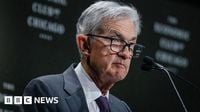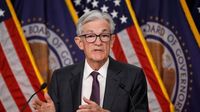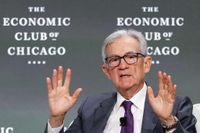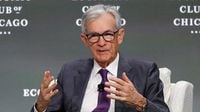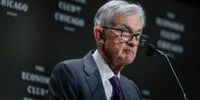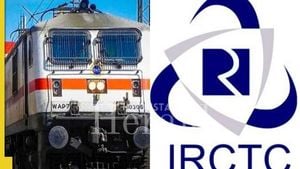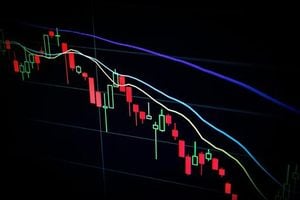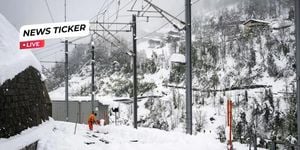In a stark warning delivered during a speech at the Economic Club of Chicago on April 16, 2025, Federal Reserve Chair Jerome Powell expressed serious concerns regarding the economic implications of President Donald Trump's recent tariffs. Powell stated that these tariffs are 'highly likely' to raise prices for consumers and create 'continued volatility' in the markets, potentially leading to stagflation—a combination of stagnant economic growth and high inflation.
Powell emphasized that the central bank is focused on ensuring that price increases stemming from these tariffs do not persist. He pointed out that the import taxes introduced by Trump were larger than the Federal Reserve had anticipated, exceeding even the higher end of their estimates. This unexpected escalation has raised alarms about the potential for rising inflation and slower economic growth.
"The level of the tariff increases announced so far is significantly larger than anticipated," Powell remarked, highlighting the uncertainty surrounding the economic effects of these policies. He noted that surveys conducted among households and businesses indicated a sharp decline in sentiment about the economic outlook, primarily due to concerns over tariffs.
Since taking office, Trump has escalated the trade war with China, imposing a 10% tax on goods from most countries and a staggering 145% tax on Chinese imports, with some exemptions for smartphones. In retaliation, China has implemented tariffs of 125% on U.S. products. The White House has also indicated that, when combined with existing tariffs, the levies on some Chinese goods could reach as high as 245%.
Powell's warnings came amid significant turmoil in global stock markets, where all three major U.S. indices experienced sharp declines. The Dow Jones Industrial Average fell 1.73%, while the S&P 500 and Nasdaq dropped 2.24% and 3.07%, respectively. Investors reacted negatively to the uncertainty surrounding Trump's trade policies, leading to a notable increase in the number of investors selling U.S. government debt. This surge in selling resulted in a rise in the effective interest rate that the U.S. government had to pay on its bonds, further exacerbating economic concerns.
Despite these challenges, Powell maintained that the U.S. economy remains in a solid position. He asserted that the Fed could afford to keep its benchmark interest rate steady, currently set between 4.25% and 4.5%, as they await greater clarity on the economic landscape before making any adjustments. This rate has been maintained since December, following a series of cuts aimed at stimulating the economy.
However, Powell acknowledged that the Fed’s dual mandate—ensuring maximum employment while maintaining stable prices—could be threatened by the current economic situation. He warned that if inflation rises due to tariffs, the Fed may face a difficult choice between combating inflation and supporting employment. "If that were to occur, we would consider how far the economy is from each goal," he explained.
Powell's cautious tone was echoed by other Fed officials, who have indicated that the tariff war could create a "challenging" scenario for the central bank. The Fed's main tool for managing the economy is adjusting the federal funds rate, which influences borrowing costs across the board. A higher rate can slow economic growth, while a lower rate can stimulate job creation. However, Powell indicated that the Fed would be reluctant to cut rates even if financial markets took a dive, emphasizing that markets are functioning in an orderly manner despite the volatility.
During his speech, Powell quoted a famous line from Ferris Bueller, saying, "Life moves pretty fast," to illustrate the rapid changes occurring in the economic landscape. He underscored the importance of not allowing a temporary rise in prices due to tariffs to evolve into a prolonged inflationary process. "Our role is to make sure this will be a one-time increase in prices and not something that turns into an ongoing inflation process," he stated.
The implications of Trump's trade policies are still unfolding, and Powell reiterated that the impact on the economy remains "highly uncertain." He noted that while consumer spending has grown modestly, there have been strong imports in the first quarter, which may reflect businesses attempting to stock up before tariffs take effect.
In conclusion, Powell's remarks serve as a critical reminder of the delicate balance the Federal Reserve must navigate in the face of evolving trade policies and their potential repercussions on the U.S. economy. As the Fed prepares to monitor the situation closely, the challenges posed by tariffs and inflation will likely continue to dominate discussions in the coming months.
